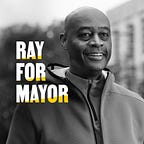What Dr. King would see today
“Slums with hundreds of thousands of living units are not eradicated as easily as lunch counters or buses are integrated. Jobs are harder to create than voting rolls.” — Dr. Martin Luther King, Jr. in 1966, after the passage of the Civil Rights and Voting Rights Acts
As we honor the legacy of Dr. King today, I am keenly aware of how far we still are from realizing his dreams of equality and justice for all.
Dr. King knew that an end to Jim Crow and laws against racial discrimination weren’t enough. He knew it would take more to close racial gaps in wages, housing, education and investment — gaps that remain wide today, 60 years after the Civil Rights Movement.
Long before COVID-19, Black and brown kids were still disproportionately educated at failing schools. Black and brown workers earned lower wages than their white counterparts. Black business owners struggled to find investment or win city contracts. Black patients frequently received inferior health care and Black women died in childbirth at unacceptably high rates.
Now, the pandemic has made so many systemic inequalities even worse. We still have kids in our city who don’t have the internet access or devices they need to attend school remotely. Black workers have faced the largest share of job losses since the pandemic began, particularly Black women. And Black, Latinx, and Native Americans have faced the highest rates of death and hospitalization for COVID-19.
Meanwhile, the killings of Ahmaud Arbery, Breonna Taylor, and George Floyd have finally shaken the U.S. and the world awake to the egregious racial inequities in our criminal justice system.
Even as one of the leading executives on Wall Street, I was still seen first as a six-foot-four, two-hundred-pound Black man wherever I went. I could have been George Floyd. My wife Crystal and I live with the fear someone may see our children as threats, simply because of their skin color.
Dr. King taught us, “We are caught in an inescapable network of mutuality, tied in a single garment of destiny. Whatever affects one directly, affects all indirectly.”
Higher rates of infection among some affect the health of all. The loss of health, life, and livelihood among communities of color diminish everyone’s economic security. In fact, when I was at Citi, I helped produce a report illustrating that racial inequality has cost the U.S. economy more than $16 trillion over the last twenty years.
Every year that racial injustice and inequality continues to fester only adds to the mounting cost racial disparities inflict on our entire society. Now more than ever, we must confront the systemic racism plaguing our city and commit to bringing greater equity and prosperity to all.
There is no racial justice without economic justice, so we need bold plans to create jobs, raise wages and ensure economic gains are distributed equitably among all New Yorkers. We must invest in our city’s kids from day one, so that they never fall behind. We need to ensure every New Yorker has an affordable place to live. And we must make this a city where every New Yorker feels safe in their communities.
These problems are not insurmountable — but they require a city united in its resolve to address these complex challenges. Together, we are beginning to build a movement committed to a new vision for New York — one that offers equity and prosperity for all.
